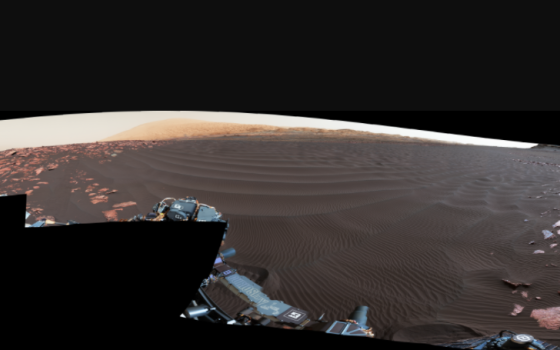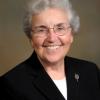I'm excited about a project that I would like to share with you. I'm working on an honor for a friend of mine — Jesuit Fr. Pierre Teilhard de Chardin (1881-1955). Although I have never met Teilhard in person, his writings have been one of the greatest inspirations in my life. I have come to know him during my own long search for how to be both scientist and believer. Without his help, my faith and spirituality would never be as strong as they are.
My friend Teilhard was a priest, distinguished scientist (geologist and paleontologist), philosopher, theologian, mystic, and one of the most influential and visionary thinkers of the Catholic Church in the 20th century. And now I would like to encourage the church to add one more title and declare him a doctor of the church.
Grounded in the theology of St. Paul, St. John and St. Ignatius Loyola and informed by the modern scientific discovery of cosmic and organic evolution, he created a pioneering and most creative synthesis of religious and scientific thought that many have found profoundly fruitful.
His concept of the "noosphere" was startlingly prescient in its anticipation of the internet and other forms of electronic communication that have the potential to unify humanity into a single community of thought.
Teilhard's thinking was far ahead of its time and very interdisciplinary, so it was difficult for those in authority to understand what he was trying to do. Unfortunately, because they were suspicious of his approach to topics regarding evolution that might affect church dogma, he was never allowed to publish his religious essays during his lifetime. Not until his death in 1955 did his works begin to appear one after another over the next 20 years.
As with St. Thomas Aquinas, whose writings were also once suppressed, history has vindicated Teilhard; he is now recognized by many scientists and theologians as one of those whose ideas have paved the way for the work of the Second Vatican Council.
Recent years have seen an upsurge of interest in Teilhard both at home and abroad. Folks are joining reading circles to discuss his works or commentaries on his works and attending workshops and retreats that focus on his spirituality and mysticism.
Even the last three popes have recognized and praised his work. Pope Francis refers to his writings in his encyclical "Laudato Si': On Care of our Common Home." Pope Benedict XVI and Pope John Paul II have also cited Teilhard's writing on the Eucharist. Teilhard's synthesis continues to stimulate theological thought inside the Catholic Church and beyond, including the development in recent decades of vigorous scholarly and popular movements of evolutionary theology and creation spirituality. His hopeful eschatological vision also continues to inspire people throughout the world.
Thus, Teilhard has already been acclaimed by many a "teacher par excellence" of the universal Catholic church.
Doctors of the church comprise about three dozen ecclesiastical writers, from early Christian to modern times, who have been honored posthumously by popes or general councils with that title due to the integrity of their faith, eminent learning, and personal holiness. Although those formally designated in the past as doctors of the church had previously been canonized, there is no requirement for this in the Code of Canon Law.
In fact, the custom has already been stretched a bit in the case of one of the latest doctors to be named, St. Hildegard of Bingen, whom Benedict designated a doctor in 2012 shortly after her "equivalent canonization" (a papal proclamation of canonization based on a standing tradition of popular veneration, rather than the formal process regularly applied in the cases of most saints).
Even though a formal cause of sainthood has not been opened for Teilhard, the widespread respect accorded him as a spiritual teacher seems to us to justify an exception to custom being made in his case as well, for designation as a doctor. This is especially timely with a pope such as Francis, one who is a Jesuit, one who was a scientist (a chemist), and one who has shown himself open to change where it is healthy for the future of the church.
So I have been inviting my friends and participants in my workshops and retreats on Teilhard to consider signing a petition asking Pope Francis to declare Teilhard a doctor of the church.
This petition was composed by members of Cosmos and Creation, an annual conference on science and religion largely inspired by the work of Teilhard, which has been held each spring at Loyola University Maryland for the last 35 years. These conferences were started under the leadership of two noted Teilhard scholars, Jesuit Fr. James F. Salmon and the late Jesuit Fr. Thomas M. King, to encourage scientists to think more deeply about the intersection between science and religion.
I invite you to join us in signing the petition and to pass the word along to others who might be interested.
His fidelity to the Jesuit order as well as to his commitment to his priestly vocation despite the struggles that he had with the church are indicative of his profound commitment to the cosmic Christ.
To honor my friend Teilhard in this way would be a fitting tribute to one who was so committed to updating the church's approach to scientific knowledge that he chose to suffer exile and ill health rather than abandon the Jesuits, the church or his call from God. I hope you will join me.
[Kathleen Duffy is a member of the Sisters of St. Joseph of Chestnut Hill, Pennsylvania. She is professor of physics at Chestnut Hill College, where she directs the Interdisciplinary Honors Program and the Institute for Religion and Science. She is editor of Teilhard Studies and the author of Teilhard’s Mysticism: Seeing the Inner Face of Evolution (Orbis Books, 2014).]

